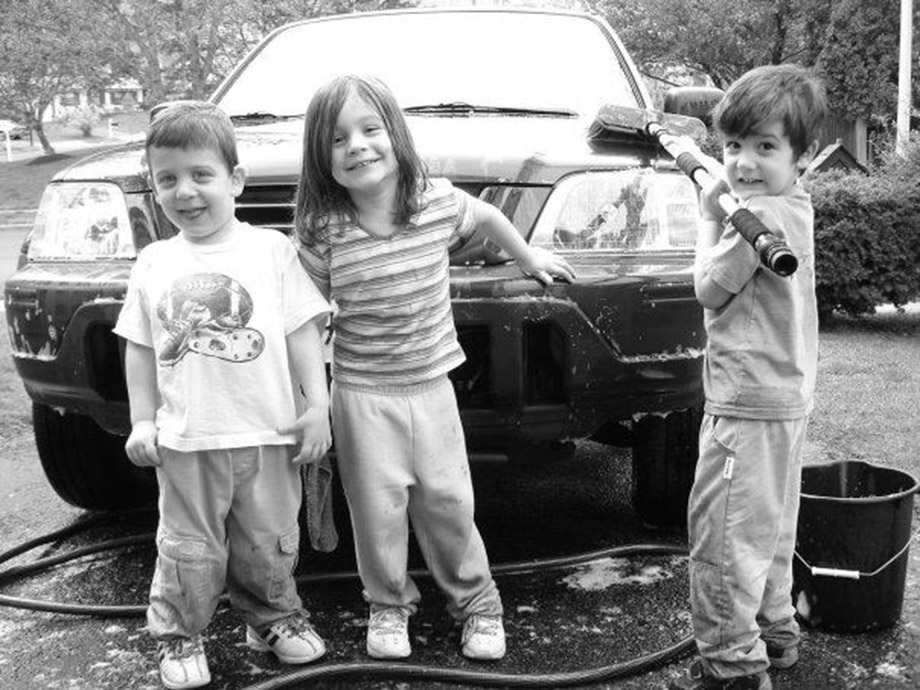When one triplet falls behind, the others help pick him up (22 HQ Photos)
Jack Smith couldn’t tell you what woke him that frigid February night. He’d grown accustomed to the noise of his 12-year-old triplet brother, Mick, and his adaptive equipment and breathing machine. Sensing something wasn’t right, Jack sat up and heard Mick vomit into his breathing mask. Jack sprang into action, leaping from the top bunk down to his brother’s side. He tore off the mask, rolled him on to his side and yelled to his parents for help. Jack saved his brother’s life that night.
Mick has a neuromuscular disease that now prevents him from accomplishing simple physical tasks like rolling over. That wasn’t always the case, though. Less than a decade prior, no one saw anything like this coming.
Cathy and Michael Smith’s initial excitement wore off quickly as the reality of raising triplets soon set in. Mick, Jack, and Grace were three newborns in need of constant attention, but at least they were healthy.
Cathy noticed Mick was always a step or two behind his siblings. Jack and Grace crawled on their hands and knees while Mick struggled to army crawl. Mick didn’t take his first steps until after his second birthday and they noticed his speech was far behind as well.
Around age 5, Mick started to catch up. Michael and Cathy enrolled Mick in Early Childhood Intervention (ECI) where he began to make impressive strides forward. Mick was able to walk, run, brush his teeth and hit a wiffleball off a tee. Mick was even learning to jump up and down. For the first time, things were looking up.
There isn’t a medical term for what happened next. Michael and Cathy refer to it as “The Slide”. “The Slide” is a nearly unexplainable physical and mental regression. Mick’s brushes with “The Slide” read like the Cliff’s notes version of a Stephen King trilogy.
The Slide I (2007): Age 5, Mick comes down with a common cold that takes months to recover from. Mick’s gross motor skills deteriorate rapidly. He begins to fall down frequently for no reason. Mick starts having daily seizures. Specialists can’t explain Mick’s condition.
The Slide II (2009): Age 7, Michael finds Mick lying on the floor staring into space, unresponsive. Mick is rushed to the hospital for a 2-week stay on what could only be diagnosed as a sinus infection. Mick’s seizures become more violent. Mick’s motor skills deteriorate to the point where he has trouble walking. He’s fitted for a temporary wheelchair. The Smith’s are desperate for some answers.
The Slide III (2011): Age 9, Mick loses the ability to walk altogether and is put in a permanent wheelchair. Swallowing requires gross motor skills that Mick no longer possesses and Mick undergoes an operation to insert a G-tube for feeding. Mick loses the ability to speak.
It was always the same story. The slides were brought on by simple viral infections. Mick would deteriorate rapidly, then make slow improvements until his next slide. After which he would never get back to where he was prior to the slide.
After years of searching for answers, MRI’s, countless needles and endless tests, the Smiths finally got some answers. The doctor explained that Mick’s condition is metabolic in nature – Mick’s body will not transport necessary amino acids to his brain. In short, Mick’s brain is starving.
Present Day:
Since saving his brother’s life, Jack has had anxiety and sleep issues. He sometimes sneaks into bed with Mick to assure himself his brother is still breathing. The attention that Mick requires has made it impossible for any of his siblings to live a “normal” childhood. On the phone, Cathy choked up as she explained how wonderful the other children are, “they don’t know how to ride a bike, but they can vent a g-tube, operate a feed pump and set up a BiPAP machine.”
Once again, things are looking up thanks to theCHIVE community. Because of your generous donations to the Chive Fund, the Smith’s are getting some much needed help in the form of a $55,000 grant from Chive Charities for a 2014 Toyota Sienna ADA accessible van.
Currently, Cathy and the other triplets have to lift Mick into the van and they always run the risk of dropping him. They also need to remove a row of seats to accommodate Mick’s wheelchair. With the new ADA accessible van the Chivers are providing the Smith family, they can now travel safely as a family.
People always tell me they love reading Chive Charities’ stories not only for their inspirational value but because they remind us that our daily obstacles pale in comparison to what some families deal with. Cathy Smith realizes what a tremendous gift Mick has been. He is doing an amazing job of defying his own limitations. “Mick’s smile and laugh are infectious,” she explains. “He may not be able to speak like you and I anymore, but he is communicating and teaching. He teaches people every day about compassion, empathy and taking time to enjoy the simple things in life. He makes the world a better place.”
UPDATE: Many of you are asking how you can donate directly to the Mick. You can donate right here
Meet Mick…



